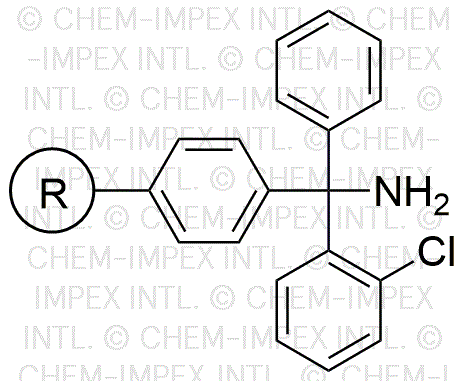Amino-2-chlorotrityl resin is widely utilized in research focused on:
- Peptide Synthesis: This resin serves as a solid support for the synthesis of peptides through solid-phase methods, allowing for efficient coupling and cleavage processes.
- Drug Discovery: Researchers use this resin to create peptide libraries, facilitating the identification of potential drug candidates by screening various peptide sequences.
- Bioconjugation: The functional groups on the resin enable the attachment of biomolecules, such as antibodies or enzymes, which can be used in targeted therapies or diagnostics.
- Analytical Chemistry: It is employed in the purification and isolation of compounds, enhancing the efficiency of chromatographic techniques in analytical labs.
- Material Science: The resin can be modified for various applications, including the development of novel materials with specific properties for use in electronics or nanotechnology.
General Information
Properties
Safety and Regulations
Applications
Amino-2-chlorotrityl resin is widely utilized in research focused on:
- Peptide Synthesis: This resin serves as a solid support for the synthesis of peptides through solid-phase methods, allowing for efficient coupling and cleavage processes.
- Drug Discovery: Researchers use this resin to create peptide libraries, facilitating the identification of potential drug candidates by screening various peptide sequences.
- Bioconjugation: The functional groups on the resin enable the attachment of biomolecules, such as antibodies or enzymes, which can be used in targeted therapies or diagnostics.
- Analytical Chemistry: It is employed in the purification and isolation of compounds, enhancing the efficiency of chromatographic techniques in analytical labs.
- Material Science: The resin can be modified for various applications, including the development of novel materials with specific properties for use in electronics or nanotechnology.
Documents
Safety Data Sheets (SDS)
The SDS provides comprehensive safety information on handling, storage, and disposal of the product.
Product Specification (PS)
The PS provides a comprehensive breakdown of the product’s properties, including chemical composition, physical state, purity, and storage requirements. It also details acceptable quality ranges and the product's intended applications.
Certificates of Analysis (COA)
Search for Certificates of Analysis (COA) by entering the products Lot Number. Lot and Batch Numbers can be found on a product’s label following the words ‘Lot’ or ‘Batch’.
Numéro de catalogue
Numéro de lot/série
Certificates Of Origin (COO)
This COO confirms the country where the product was manufactured, and also details the materials and components used in it and whether it is derived from natural, synthetic, or other specific sources. This certificate may be required for customs, trade, and regulatory compliance.
Numéro de catalogue
Numéro de lot/série
Safety Data Sheets (SDS)
The SDS provides comprehensive safety information on handling, storage, and disposal of the product.
DownloadProduct Specification (PS)
The PS provides a comprehensive breakdown of the product’s properties, including chemical composition, physical state, purity, and storage requirements. It also details acceptable quality ranges and the product's intended applications.
DownloadCertificates of Analysis (COA)
Search for Certificates of Analysis (COA) by entering the products Lot Number. Lot and Batch Numbers can be found on a product’s label following the words ‘Lot’ or ‘Batch’.
Numéro de catalogue
Numéro de lot/série
Certificates Of Origin (COO)
This COO confirms the country where the product was manufactured, and also details the materials and components used in it and whether it is derived from natural, synthetic, or other specific sources. This certificate may be required for customs, trade, and regulatory compliance.


